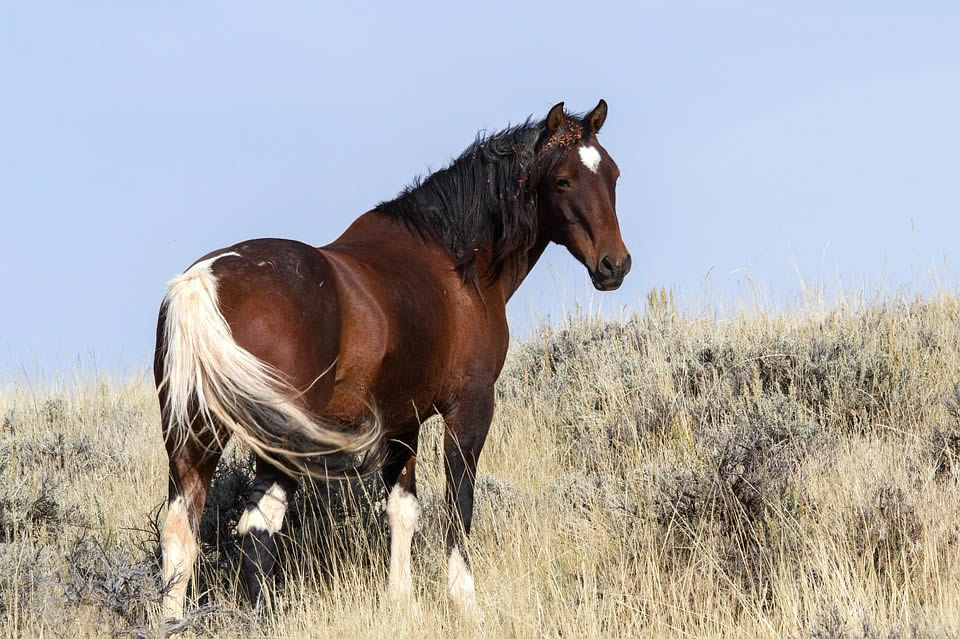Wild Horse Program: Summary of Congressional Response to Budget Proposal
This past year, the wild horse world has been filled with the news about the Trump administration proposal for humane euthanasia of wild horses gathered and removed from their BLM herd management areas and living in short and long term holding facilities. The House and Senate have responded differently to this proposal: The House supports, and the Senate opposes, the Trump administration proposal. We have been keeping track of the process, and although there has been excellent coverage on other websites, we wanted to share the chronology that we have developed far.
The PMWMC board will provide input to the BLM’s planning process that uses our history of working cooperatively with the Billings Field Office on effective temporary fertility control for the Pryor Mountain Wild Horse Range to find ways to expand its use to a broader national scale. The board believes that effective on-the-range management in the BLM’s herd management areas, including temporary fertility control, would reduce the number and scale of gathers, lowering future costs of caring for wild horses in holding facilities. In the meantime, however, the answer is notto humanely euthanize healthy, unadoptable wild horses that are already in short and long term holding.
Back in June, Interior Secretary Zinke testified before House and Senate appropriation subcommittees responsible for funding the Interior Department which administers the Wild Horse program through the Bureau of Land Management. He testified in defense of the Trump administration’s proposal to allow federal funds to be used for humane euthanasia, citing an unsustainable growth in the costs of caring for wild horses in holding facilities.
In mid-June, the House Interior Appropriations Subcommittee adopted language in its draft bill protecting wild horses from humane euthanasia:
“Appropriations herein made shall not be available for the destruction of healthy, unadopted, wild horses and burros in the care of the Bureau or its contractors or for the sale of wild horses and burros that results in their destruction for processing into commercial products.”
In July, however, the full House Appropriations Committee took up bills from each subcommittee. There were opportunities at that point for members to offer amendments to the Interior Subcommittee draft, and Rep. Stewart from Utah brought an amendment striking the subcommittee’s language restricting the use of funds for humane euthanasia, but keeping a restriction on sale for slaughter. The Committee passed the amendment by a voice vote (i.e. unanimous) and the process then moved to the Senate. This amendment would allow for humane euthanasia of wild horses in holding facilities.
Last week, the Senate Appropriations Committee released its bill for the Department of Interior, and unlike the House version, it contained restrictive language similar to that of the House subcommittee. This bill would prohibit humane euthanasia on horses in holding facilities. Since the language in the final Congressional Appropriations has to be approved by both House and Senate, there is another step in the process: there has to be agreement on the final language, including whether to keep the restrictions on humane euthanasia or accept the Trump administration’s request.
The Congressional appropriations process is a moving target for anyone who is trying to keep up with the status of funding for the Wild Horse Program and how it could affect wild horses in holding corrals and pastures. We will keep tracking what is happening in Congress, and will try to answer any questions as time allows.
There was a separate question last summer about whether Congress should approve funds for USDA to conduct inspections at horse slaughter plants. Plants closed several years ago because, among other reasons, Congress restricted the use of funds for USDA inspectors. The House approved the inspection funds, but the Senate inserted the following language in its Agriculture Appropriations bill:
“None of the funds made available by this Act may be used to pay the salaries or expenses of personnel (1) to inspect horses under section 3 of the Federal Meat Inspection Act (21 U.S.C. 603); 11 (2) to inspect horses under section 903 of the 12 Federal Agriculture Improvement and Reform Act of 13 1996 7 U.S.C. 1901 note; Public Law 104–127); (3) to implement or enforce section 352.19 of title 9, Code of Federal Regulations (or a successor regulation).” House and Senate have to negotiate an agreement on this question too.
It is going to be harder to track what is happening during these final negotiations, but we will try to keep you informed. In the meantime, contact your elected representatives and let them know how you feel about these important issues.
PMWMC Board of Directors

